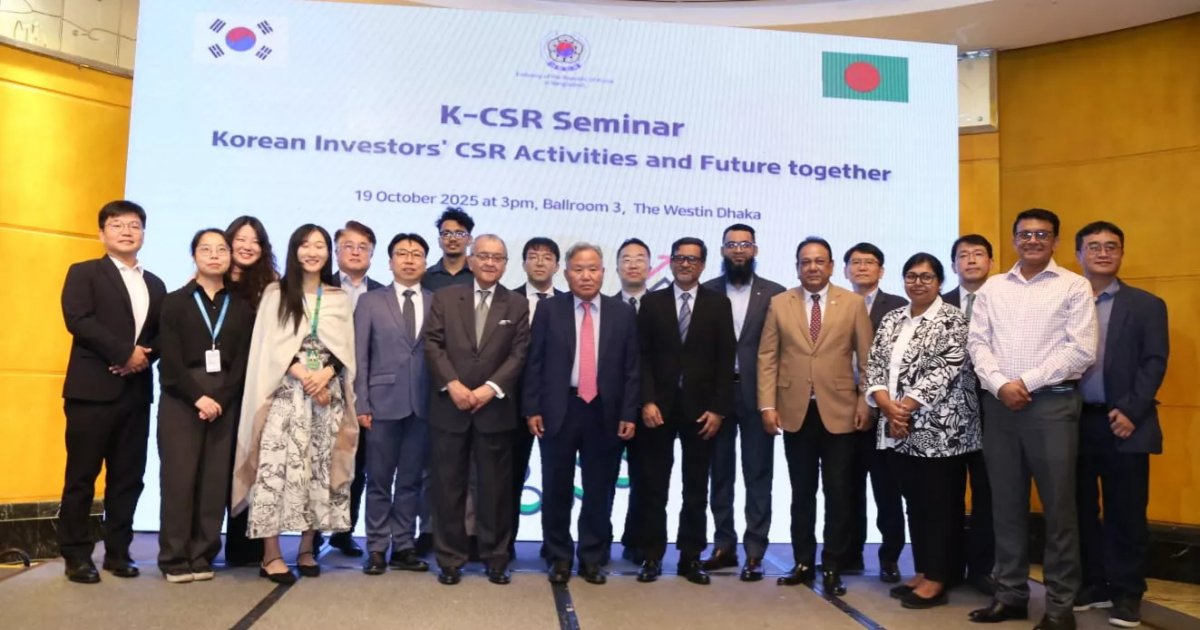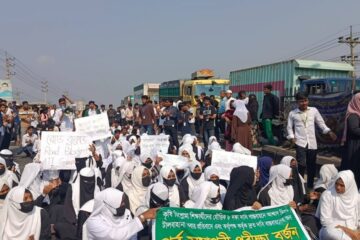Bangladesh and South Korea are negotiating a Comprehensive Economic Partnership Agreement (CEPA) that will strengthen bilateral trade and investment, South Korean Ambassador to Bangladesh Park Young-sik has said.
Speaking at a seminar titled “Korean Investors’ CSR Activities and Future Together” on Sunday, the ambassador said the CEPA would offer “another opportunity to take the existing close relationship a step further.”
“Korea does not pursue strategic interests beyond our economic cooperation,” Park said, noting that both nations are committed to a brighter, more prosperous future built on five decades of collaboration.
Hosted by the Embassy of the Republic of Korea, the event highlighted Corporate Social Responsibility (CSR) as a driver of sustainable development and stronger Korea-Bangladesh partnerships. Stakeholders included KBCCI President Shahab Uddin Khan and KOICA Country Director Jihoon Kim.
Park noted Bangladesh’s appeal to Korean investors, citing its fast-growing economy, strategic location, and abundant labor force. He urged improvements in the business environment, including timely visa issuance, seamless customs clearance, lower tariffs on raw materials, resolving overdue payments, and allowing repatriation of profits.
Highlighting the role of CSR, the ambassador said: “Korean investors and NGOs have shown unwavering dedication to promoting inclusive growth and social welfare in Bangladesh. We remain committed to continuing collaborative CSR efforts aligned with Bangladesh’s sustainable development goals.”
He also called for diversification of exports, noting that while Bangladesh’s exports to Korea are rising, they remain limited. “Footwear, ICT products, leather goods, light industrial products and pharmaceuticals can be further exported. A bilateral CEPA can provide an impetus to increase Bangladesh’s share in Korea’s market, especially RMG items,” he said.
Park stressed Korea’s support for Bangladesh’s infrastructure development and technical education, citing its role in the RMG sector and ongoing development cooperation in education, water, sanitation, health, and transportation. “Korea is fully committed to strengthening TVET to address trainer shortages, technology gaps, and outdated equipment, with KOICA supporting capacity-building so workers are prepared for future growth,” he said.
The seminar also showcased Korean companies’ CSR initiatives. Youngone Corporation, through the Korean Export Processing Zone (KEPZ) in Chattogram, set a global benchmark in eco-friendly industrial development with over three million trees planted and Bangladesh’s largest rooftop solar project generating 37 MW. The company also supports education, healthcare, and women’s empowerment through a 100-bed medical complex, a fashion and textile institute, and local scholarships.
Other participants included LG Electronics, Samsung R&D Institute Bangladesh, Woori Bank, and Dohwa Engineering, alongside NGOs such as Save the Children Korea, Oxfam Korea, Habitat Korea, Good Neighbors, ADRA Korea, and Global Care, highlighting initiatives to improve livelihoods and social welfare across Bangladesh.
Chairman of the CSR Centre, Farooq Sobhan, emphasized the importance of CSR in building trust and long-term business partnerships between the two nations.
Since establishing diplomatic ties in 1973, Bangladesh and Korea have developed strong cooperation across trade, investment, development, and people-to-people exchanges, with the RMG sector playing a central role in bilateral relations.



